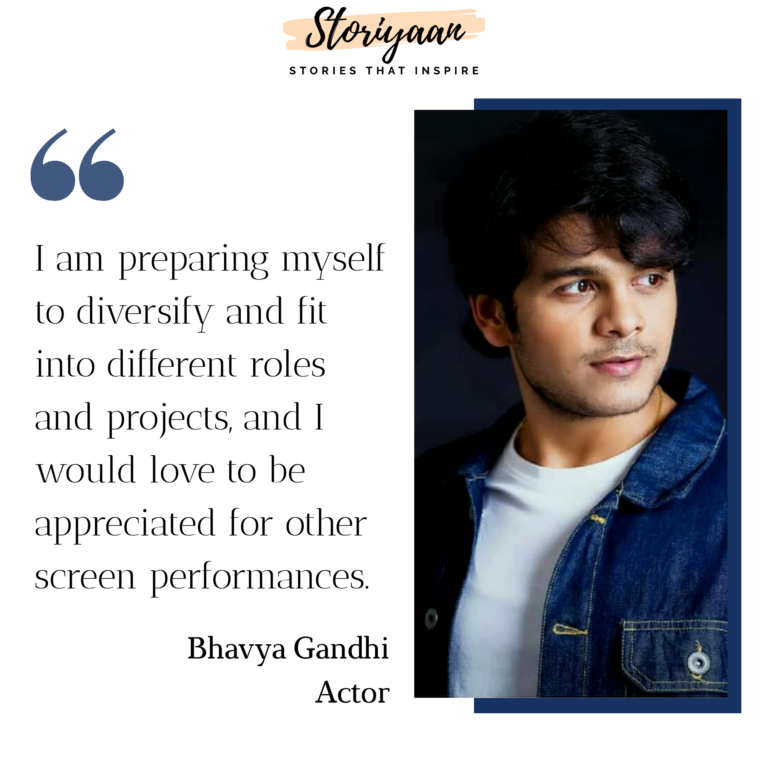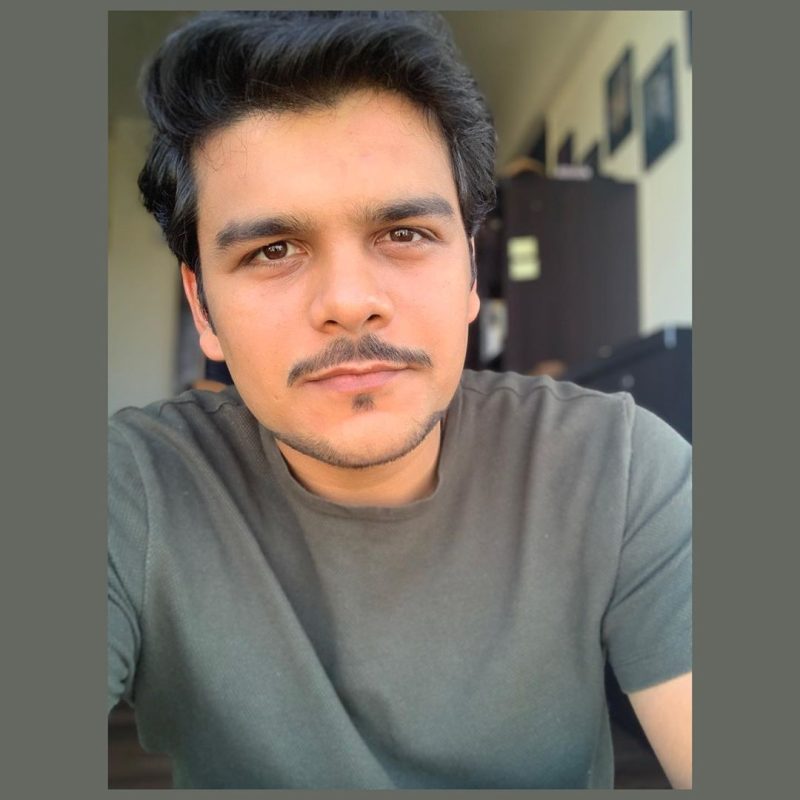Bhavya Gandhi is an Indian actor who is known for his portrayal of Tapu in Tarak Mehta ka Oolta Chasma. A known face in the entertainment industry, Bhavya’s debut film was a Gujarati movie. He is recognized for his role in Bau na Vichar, which also happens to be a Gujarati drama.
Bhavya Gandhi is extremely fond of nature and wishes to give back to society through his little kindness deeds. Catch Bhavya in a conversation with Storiyaan, where he talks about destigmatizing mental health, his love for writing and future vision, his character in the show Tarak Mehta ka Ooltah Chasmah and his major takeaway from his role as a child artist.

Interview
Questions and answers
Bhavya, you are loved already by millions of people for your character as Tapu in TMKOC. What is the story behind it?
I gave the audition, and later I gave the pilot shoot. I was very nervous and afraid at that time and was told that you wouldn’t be able to do it. The next day the producer of the show called me, and we talked. I promised to do better than what was expected, and this is how Tapu happened. I gave my best, and people loved what they saw!
It's been quite a few years since you left TMKOC. What did Bhavya Gandhi learn from the character of Tapu?
I learned that it is okay to be notorious and make mistakes, but you should have a golden heart and do good deeds. Tapu was an innocent character and was very much like Lord Krishna, and that innocence, in a way is something I have imbibed in my life.
Your role in Tarak Mehta ka Oolta Chasma was highly appreciated and loved. You said your character felt sidelined, and you left the show. Why did you feel so? Were there any particular moments when you felt like that?
After a certain point, I felt that I had grown to be an adult and was no more the kid that the character demands me to be. The beat of the character was dying and I could not do justice to the role. I realized I need to move on, and I need to explore more characters and see where I stand as an actor. I appreciate people loving me as Tapu, but internally, I also wanted to know where I was as an actor. I didn’t know who am I. “Was I a good actor overall? Will I be able to do other roles?” I wanted to know. So that was a major reason.
Even today, people call you Tappu and link you to TMKOC. Do you ever feel that you have been put into a bracket because of your role as Tappu?
When I left, I felt very different as I have been in the role for quite a long time. I knew that people would never forget this role, and I guess it is okay to accept that people will not forget Tapu and I am grateful for it. I allowed myself to do whatever I was to do, for instance- do different kinds of roles, over the top roles, under roles, and explore myself as an actor.
I am preparing myself to diversify and fit into different roles and projects, and I would love to be appreciated for other screen performances.
What's the most important lesson you've learned from the sets of 'Bau na vichar'?
Bau na vichar was my second Gujarati film. What I loved about that is childhood is not inevitable, but the child in you is. Childhood will be over, but we should never lose the child in us. That’s what we all learned; I learned a lot from my whole team and cast, cast all are my age only. We were all youth and was at the same age group, so it was an entire youth-based film. It opened a lot of perspectives in me in a way.
You have beem associated to many animal welfare organizations and programs. When did you discover your love for animals? How do you think you can use your platform to spread awareness about animal welfare?
I became aware that I should be doing something about animals and nature in general while I used to watch Discovery. I became more inclined towards nature. I have started loving animals and nature since then. I have been associating myself with the welfare organizations to do my part to contribute to the mother nature by doing some little kind deeds.
You were recently interviewed on the talk show "Manan Ni Therapy." How was the experience? Was it different from a normal interview?
Yeah, of course. Normal interviews are way different as they revolve around my professional and personal life only. Manan Ni Therapy talked about the stigma around mental health. Mental health is extremely important, and this show really highlighted it. It was a lovely experience to be on the show
Speaking of mental health, what do you think everybody should do to take care of their mental health? What would you advise?
Take care of themselves first. There is a thin line between taking care of yourself and being selfish. One should be aware of themselves, should be happy with themselves. Even if you don’t have an iPhone or an expensive laptop, you should be happy with yourself. That’s what defines us. I have done psychology, BA psychology, and BA literature. I know psychology but let me tell you that life experiences teach us more. It will only come if you want it to come. You become what you attract in your life.
You said that, when it comes to acting, you always wish you could improve. Can you elaborate on that?
Since I started understanding the whole concept, I make a point and share my perspective too. I’ve become slightly intolerable to the directors and writers. I frequently discuss why this particular character is portrayed with directors, and these discussions go up-to a couple of nights long. I would say improving is as important as adding perspective to the role. I am not suggesting to decline the point of view of directors or writers’. I advise having your perspective towards the character you play and interact with.
Your liking for poetry is not hidden. When did you discover your love for them? Do you also write?
Yes, I do write, and I discovered my love for poetry via Piyush Mishra. I loved listening to his work while working in TMKOC. I found myself inclining towards his writings. I loved every piece he wrote. This is from where I got the motivation to try my hand in writing. It started with mimicking his process, and in time I could write lines on my own.
How did Doha walis of Kabir stir you to start episodes of 'Bas Ek Baat'?
Piyush Mishra is the reason to start ‘Bas Ek Baat.’ The uniqueness of the title for a combination of ‘kavita‘ (poetry) and ‘bhajans‘ (hymns) is what ‘Bas Ek Baat‘ is. I love to read a lot about Piyush Mishra and Rajesh Joshi and their poetry. That’s how Bas Ek Baat started, and Kabir’s Doha walis were one of the most-watched videos. I was inspired to write about Kabir during my first year of undergraduate college, about who he is, what he did, what he writes about, and his creation.
How did you prepare yourself for the role of an alien on 'Shaadi ke siyape'? Were you fascinated by the character?
I wanted to explore and learn my character in ‘Shaadi ke siyape.’ The character of Alien’ nanku’ in ‘Shaadi ke siyape’ was of a Punjabi guy. I was very excited because playing Punjabi was interesting. When I was called in for the audition, they suggested portraying this character in Gujarati. The peculiar speech of this character sparked my interest. For instance, instead of saying ‘gulab jamun’ Nanku would say ‘julab gamun.’ The innocence of the alien is what bound me to Nanku.
You are passionate about writing and write for Gujarati news articles. Do you see yourself pursuing this, working your way into scriptwriting sometime in the future?
I don’t know whether I will go with that. I’m grateful that I got an opportunity to write a Gujarati news article. Back then, I didn’t know how to write a news article. They supported me, I wrote a rough piece, and they took care of the rest. That’s how we started about two years ago. It was a great experience. I have learned a lot. I am thankful for the love and appreciation that I received from the community. I love the fact that my audience responded well to my personal and social experiences that I had written. I love that they appreciate the real me.
Also read the interview of Jennifer Bansiwal, Roshan Sodhi from Tarak Mehta ka Ooltah Chasmah
What are your visions for the future? What do you want to be five years from now?
A better human, with the ability to achieve all that can be achieved. I want to be a better human being than I am right now.
Quick 5
1. A person who’s biopic you would love to work on: Chhatrapati Shivaji Maharaj
2. Your role model for being a director: David Fincher
3. Acting or Directing: Directing
4. If you could swap lives with anyone,who would you swap with: A mother
5. Free food or free travelling: Free food (not just for me but for everyone free food, education, shelter)

